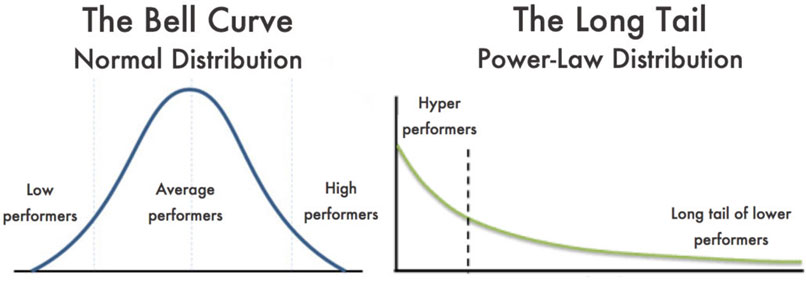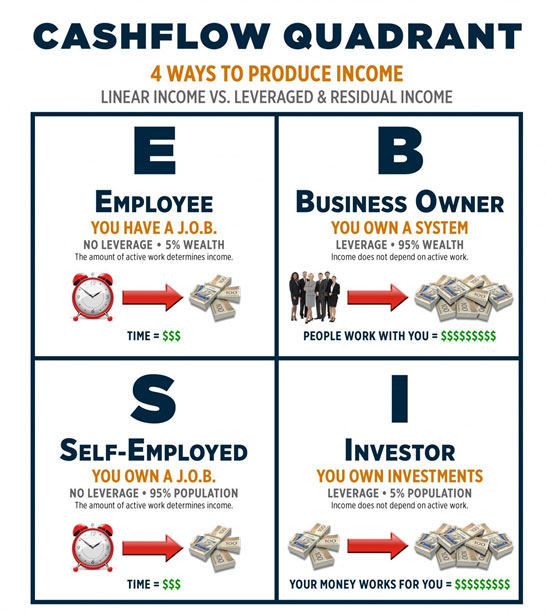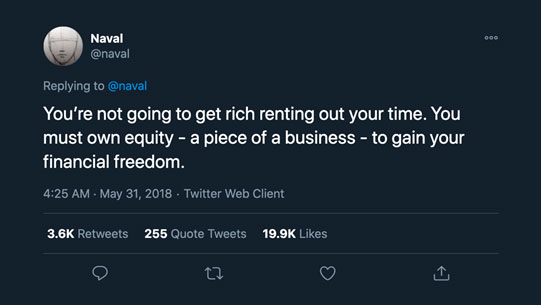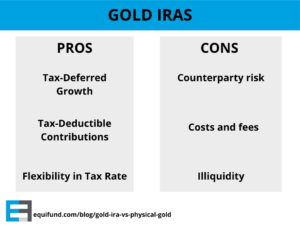Of course, everyone wants to double their income…work less than 30 hours a week… and have the “Personal Freedom” to work when and where they want.
But what’s the secret to actually making that happen?
It has to do with something I like to call…
The 7 Power Laws of Wealth Creation
Most people think in linear terms. They take where they are right now and project out in a straight line.
For example, to double a cake recipe, you need twice as much flour. To drive twice as far, it will take twice as long.
Linear relationships, in which “twice-as-big” requires “twice-as-much”, are simple and intuitive.
But investment returns aren’t linear… they are exponential.
In his seminal book, Zero to One, Peter Theil writes…
The biggest secret in venture capital is that the best investment in a successful fund equals or outperforms the entire rest of the fund combined.
This implies two very strange rules for VCs.
First, only invest in companies that have the potential to return the value of the entire fund.
This is a scary rule, because it eliminates the vast majority of possible investments. (Even quite successful companies usually succeed on a more humble scale.)
This leads to rule number two: because rule number one is so restrictive, there can’t be any other rules.
This phenomenon is known as a Power Law… and it’s the unfair – almost invisible – “law of the universe” that defines everything around us.
Because in life – and investing – success is not evenly distributed on a “Bell Curve” we all learned about in school.
Instead, it is heavily skewed towards only a handful of winners.
If you’ve ever heard of the Pareto Principle or
“80/20” rule – 80% of the results come from 20% of the effort – you’re already familiar with this concept.
And if you’re looking to turbocharge your finances so you can achieve your version of Personal Freedom…
The key is to focus your money, time, and energy on opportunities that can produce enormous returns.
Or put another way? You need to focus on making highly leveraged bets that have fixed downside and potentially unlimited upside.
As the publisher here at Equifund, part of my job is to help issuers craft their offering pages.
As part of my due diligence process, not only am I doing research on the broader market opportunity the company is targeting…
I’m also looking to understand how (and if) the company will create and monetize value in order to deliver outsized shareholder returns.
That’s where the 7 Power Laws of Wealth Creation come into play!
They are…
- Power Law #1: Purpose
- Power Law #2: People
- Power Law #3: Partners
- Power Law #4: Intellectual Properties
- Power Law #5: Brand Promises
- Power Law #6: Promotions
- Power Law #7: Profits
But because we as people are, in essence, startups…
It’s also a useful framework we can use to help us identify our very best opportunities…
Understand how we can leverage our existing assets and resources…
And if needed, how to get access to capital in order to reach our goals faster!
If you’re not “already rich” – meaning you are still in the “accumulation” phase of wealth building…
The #1 thing you can do to achieve Personal Freedom is to focus on…
Creating Leveraged Income Opportunities
If you’ve ever read Robert Kiyosaki’s Rich Dad Poor Dad – the #1 best-selling personal finance book of all time…
You might remember the Cashflow Quadrant.
For those who haven’t seen this, it describes the four ways to produce income.
- Employee –You work for someone else and you trade time for money
- Self-Employed – You work for yourself and trade time for money
- Business Owner – You own a system and other people work for you
- Investor – You own investments and your money works for you.
And almost always, people move through the quadrants in that order.
But generally speaking, there’s an important aspect of income creation I think isn’t fairly represented on this chart…
It’s the shift from “time-based income” to “value-based income.”
Here’s what I mean…
If you’re a wage-earning employee, there is an assumption from your employer that you are creating value of some sort.
However, you will get paid a fixed amount of money, regardless of the value you create.
This means no matter how much value you create, your income will always be linear: to make more money, you have to work more hours.
But when you start getting paid for the value you create – for example, in a performance-based sales job – now you have leverage!
The more value you create (i.e. sales) the more you are paid.
This means you can work the same amount of hours (or less) and make 2x, 5x, even 10x as much.
But the tradeoff here? Risk.
In the first example, your employer takes all the upfront risk and in exchange, you get paid your wage.
In the second example, you are taking some (or all) of the upfront risk and in exchange, you get paid based on the value you create.
Most people choose the first option…
But ironically, being an employee carries a lot more risk than people realize!
Here’s why…
When you’re compensated on the value you create, you earn exactly what you’ve negotiated.
If you underperform, you earn less. If you overperform, you earn more.
But when you’re a wage earner – and you’re not crystal clear on the value you are supposed to create – you will always be viewed as a cost center in the business!
And this means your job is never safe.
As the Naval Ravikant says in his famous “How to Get Rich (without getting lucky) tweet storm…
And in my opinion, the first business you should own is “You, Inc.”
A literal entity (like an LLC) that you’ve set up as a wealth creation vehicle.
Why? Because it’s almost impossible to be an investor if you don’t understand how businesses work.
And in my opinion, the best way to learn is to learn by doing.
Because once you start to think like a business owner… you’ll start to think about how to create leveraged income opportunities.
And once you do that, you’ll start to unlock the power of the 7 Power Laws of Wealth Creation.
Sincerely,
Jake Hoffberg – Publisher
Equifund
















